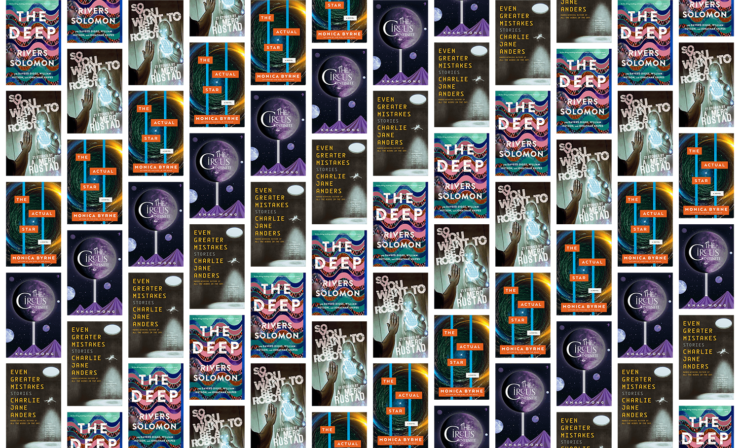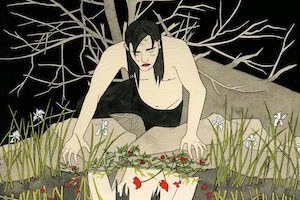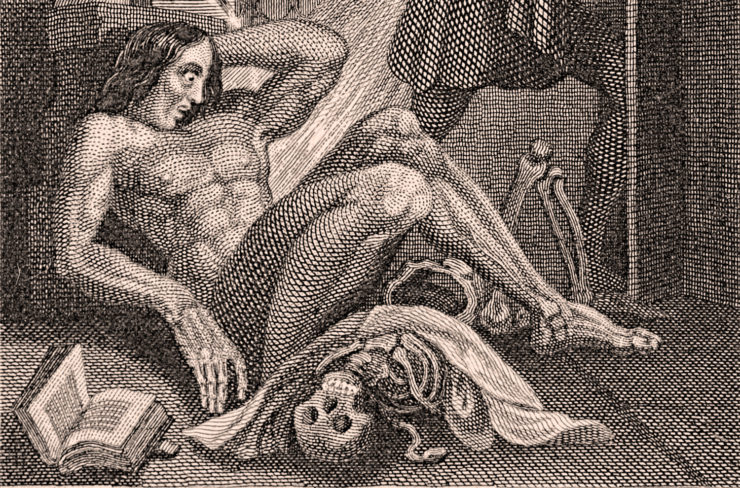One of my biggest joys is reading a secondary world that doesn’t replicate our real-world oppression in them. This is particularly true of queer issues. Given that the US—and many other countries around the world, but I’m in the States—is currently attacking queer and trans kids in addition to reproductive rights (and upholding ableist white supremacy, but that’s another, albeit related, topic), I find it more and more pressing to find secondary worlds in which queerness is normalized (even though that technically means characters are no longer queer).
For me, queernormative books represent possibilities of something better, but also like a homecoming: when I was at Lambda Literary’s fellowship retreat a few years ago, being among all queer people, where our queerness was assumed and also unquestioned, I finally felt like I was in a community where I belonged—and reading queernorm books has that exact same feeling for me. “Why don’t you write such worlds?” one may ask, and indeed, I have! The Bruising of Qilwa, my debut, is a novella that introduces my queernormative Persian-inspired world. But in the meantime, there are plenty of incredible books with queernormativity embedded in the worldbuilding, and here are five below.
The Actual Star by Monica Byrne
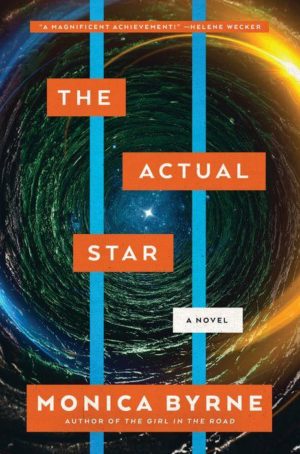
The Actual Star is a tour-de-force that should be on every awards list and every bookshelf. Pitched as Cloud Atlas by way of Octavia Butler, the story pieces together three timelines, each 1000 years apart, following Mayan twin rulers around their coronation (1012), a half-Belizean young woman as she visits Belize for the first time (2012), and two people with opposing viewpoints on how to move forward with religion and the new world order (3012). This book is so thoughtful on every level from character unveiling to thematic connections across the millennia, and the worldbuilding in 3012 is particularly masterful. It’s a post-capitalist, post-climate collapse, post-white supremacist world where people have both sets of genitals and have orentiations that describe the type of relationships and pleasure they prefer rather than ascribe the words we use to describe queerness today. If you want a hopeful vision of what our future can be, one that views all the issues of our current society and offers not despair but tangible solutions, I cannot recommend this book enough.
The Deep by Rivers Solomon and clipping.
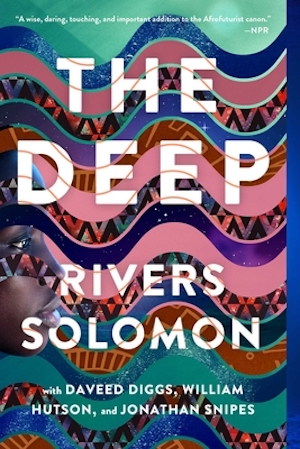
The Deep is a novella that can be hard to read and harder to sit with. It’s in this funny liminal space where it’s not technically secondary world because it stems from the atrocities of the transatlantic slave trade, but the society described in the book functions separately enough that I think it belongs in this list. The wajinru are the merfolk-like descendants of pregnant African women thrown overboard during the passage, but this traumatic beginning is held only within their historian, Yetu’s, mind. Yetu is eager to escape the burden of her position, and eventually meets a human named Oori. Although the connection between Yetu and Oori is a romantic and queer relationship, I turn instead to the wajinru society as a whole, which is not predicated on cisheteronormative or even monogamous relationships. Although discussions of queerness often focus on relationships or attraction, queerness is also a sensibility—a disruption of one’s understanding, a blurring or discarding of edges. The wajinru society is fundamentally queer, where interdependence and care for others is a central tenet of the society for about everyone but the historian. Gender is a nebulous thing in this society, and relationships can be casual and fleeting or longer term. Solomon’s novella is a powerful reminder of how even worlds set within our world can reexamine the assumed tenants of our societies.
The Circus Infinite by Khan Wong
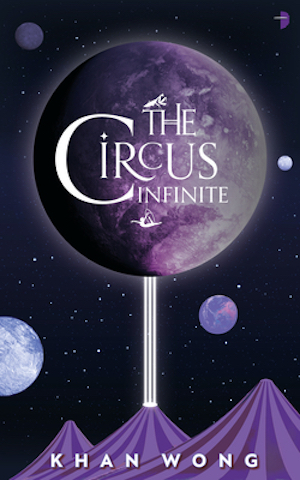
The Circus Infinite is a little like if The Night Circus and Star Wars had a baby and named it after The Godfather by way of Mike Chen’s We Could Be Heroes. By all that, I mean to say: it’s partially a story about cruel experimentation and finding your place afterward, partially a story about a terrible mobster out to make the most money by abusing people, and partially about found family in a space circus. And above all that, The Circus Infinite is delightfully queer. Polyamorous triads are mentioned alongside monogamous couples; people are queer without anyone else expecting otherwise. I mean, it’s set in space, for heaven’s sake, a space where human racism is no longer even as interspecies mixing is still a new concept (because worlds are insular). Although there is internalized acephobia, there is no real indication that being asexual is weird, except from the main character (who, granted, has been “different” all his life as someone of mixed species with incredible powers). But after disclosing his identity, no one around the main character treats him as if being ace is gross or abnormal, instead checking that they don’t cross boundaries. Except for the mobster guy, but he’s literally a villain, so I think it’s okay that he doesn’t care about personal boundaries.
Even Greater Mistakes by Charlie Jane Anders
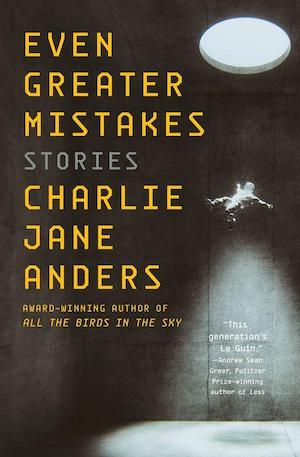
Charlie Jane Anders has demonstrated time and time again that not only is she a master of novel-length fiction, she’s a master of short fiction—and queerness is deeply embedded in her debut short story collection, Even Greater Mistakes. Charlie Jane approaches her short stories the way she does all her work: with immense care, centering marginalized characters but particularly queer characters. Some of the queerness presented in these stories is, frankly, casual: for example, in “Clover,” an ostensible sequel to All the Birds in the Sky, the couple presented are queer. Many of the stories have this sort of “background” queerness—where characters are not dealing with homophobia or transphobia but, instead, questions like “what do I spend my genie wishes on when the world has been destroyed?” and “would time travel work if you don’t account for the position of the earth, also spacetime” and “what’s the relationship between slapstick comedy, interpersonal violence, and war” drive the collection. But then there are stories like “Love Might Be Too Strong a Word,” where the author’s note describes the intricate understanding of a society with SIX pronouns and sexualities and what that means, or “Because Change Was the Ocean and We Lived by Her Mercy” about queer community rebuilding in the face of climate catastrophe in San Francisco. Of course, because this is a collection, there are stories where there are threads like transphobia—see “Don’t Press Charges and I Won’t Sue,” for example—but even those are serving a larger point to reinforce queernormativity.
So You Want to Be a Robot by Merc Fenn Wolfmoor
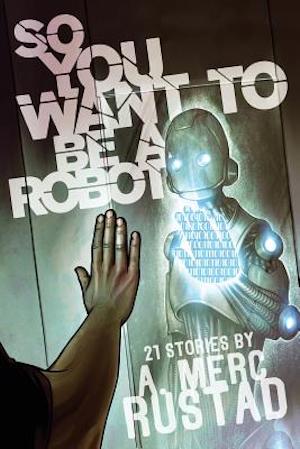
Merc Fenn Wolfmoor’s debut short story collection is how I discovered that queernormative worldbuilding can be a thing. Although all these stories are queer, none are about queerness. Take the opening story, “This Is Not a Wardrobe Door,” about doors leading to a parallel (and cursed) magical land. The story is ostensibly about the inner child, or about connections throughout time and space, or about holding onto one’s love and wonder—but not about queerness, despite the protagonist being nonbinary and eventually having a girlfriend. But there is also queer sensibility—through disruption of what is seen as “normal”—throughout the stories as well. In “Tomorrow When We See the Sun,” the protagonist Mere is a sexless bipedal wraith who uses “it” pronouns but has deep compassion for its victims, disrupting what we view as human. Similarly, in “The Android’s Prehistoric Menagerie,” an android is able to have a family of extinct species; queering family means disrupting what we think family must be. The stories in this collection explore all these ideas and more, and even those that mention queer antagonism do not linger. I have to stop myself here—I literally wrote a five-paged craft paper on this collection in grad school and could go on!
Buy the Book
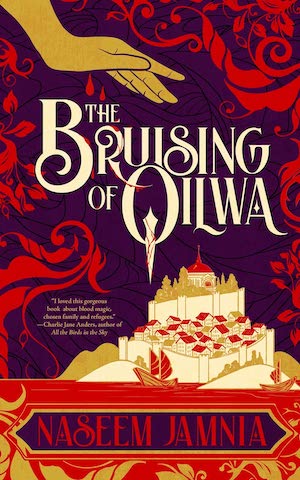

The Bruising of Qilwa
Naseem Jamnia is is a queer, nonbinary, trans Persian writer from Chicago. They are a former neuroscientist and a recent MFA graduate from the University of Nevada, Reno. Their work has appeared in the Washington Post, Cosmopolitan, The Rumpus, The Writer’s Chronicle, and other venues. They have received fellowships from Bitch Media, Lambda Literary, and the Otherwise Award, and they recently received the inaugural Samuel R. Delany Fellowship. Jamnia is the managing editor at Sidequest, an independent gaming-criticism website that centers the voices of queer and marginalized genders, and they are also an author mentor through Author Mentor Match. A Persian-Chicagoan and child to Iranian immigrants, Jamnia now lives in Reno with their husband, dog, and two cats.










